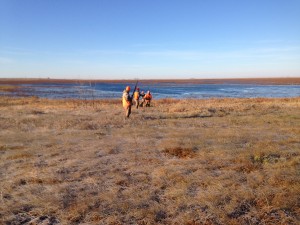
Hunting the prairie.
It is indeed too damn nice. We’re stalking pheasants on the prairie outside Ashley, North Dakota and the sun is high, the air still, and the honking of geese, cranking of sandhills, and quacking of ducks in migration creates a cacophony of noise. I have come to North Dakota on my annual hunting trip with my 88 year old father Harry, my sons Matt, Chris, and Jack, and Matt’s high school friend, Reid Amborn, to escape the worries and troubles of the courtroom and my unproductivity as a real estate novelist. We’re here, occupying a house in downtown Ashley as our base of operations, for what I believe is my tenth year on the Great Plains chasing ringnecks. Matt did yeoman’s work reserving the house, creating a menu, and buying supplies. But because someone else had rented the house for the non-resident opener, we’re here a week later than usual. As a consequence, I packed winter clothing, knowing full well from past trips that winter can roar into Ashley with brutal surprise. Our Eagle Scout preparedness (Reid is also an Eagle) turns out to be mostly overreaction. The weather is more like May than November.
We have, for three years, settled into a routine of hunting CRP land; land set aside by private owners under various federal and state conservation programs to allow hunters access to native grassland, bottomland, treelines, and sloughs. But, like so many things in America today, the opportunity to hunt CRP is diminishing. Corn prices, escalated by the demand for ethanol, have turned many CRP plots into cornfields. You can’t blame farmers. If a landowner can make more money planting crops than leaving his or her land idle for public use, how is that his or her fault? As we start our our first day hunting (missing sunrise, our appointed starting time by a good hour), we walk familiar land, a large plot of CRP that’s harbored birds in the past. Matt’s rusty red Labrador, Lexie, and Jack’s little two-year old black Lab, Kena, work well together, weaving in and out of the tall prairie grass and brush. We flush a hen or two but no shootable roosters as we make our way towards open water where rafts of waterfowl, including several thousand snow geese, float. The geese are safe from us. We aren’t hunting waterfowl, only pheasants and partridge and grouse. As we work a section of lowland, cattails slapping our faces, the dogs pushing through chin high cover, pheasants, including a few roosters, scatter before us, catching us unaware. The shots we throw after the birds are ineffective. We push on, following the fleeing pheasants towards water’s edge.
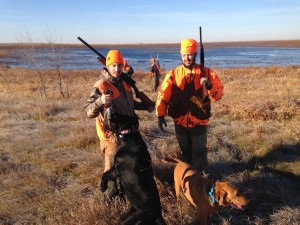
First bird.
“Rooster!” A big emerald and scarlet headed male jumps up. Shots echo. The bird flies on. Chris takes one last shot in desperation and the bird tumbles to the ground. The dogs bolt towards the downed bird and arrive simultaneously at the stricken rooster. “Kena!” Jack shouts, calling his dog off the bird. Lexie retrieves the pheasant and delivers it to Matt.
We stop for lunch, our shirts wringing wet, our long johns soaked, meeting up with my dad who’s been driving around in Chris’s Nissan Xterra scouting out
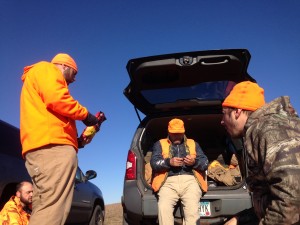
Lunchtime.
potential hunting spots. I sense my old man is frustrated by age and his inability to join us in the field. He has the gumption to do it all right. Just not the legs or endurance. I try to cut him some slack as he makes suggestions of places to hunt, places we’ve either scouted as a group and decided against or driven past and deemed unlikely prospects. Still, we humor him and, after lunch, try a couple of the places he’s viewed. We see few birds, mostly hens, and shoot none.
Days two and three in the field aren’t much better. Weary after tromping through swamp, brush, grass, and cattails eight hours a day, I’m pretty depressed, as is Chris, about the whole experience. “I don’t know that it’s worth it to come back to Ashley,” Chris laments. I tend to agree with the sentiment but, having tried my hand at finding other places in North Dakota to hunt and having failed at the task, I offer no ready remedies for our misery. At least, given Matt’s superior abilities as a quartermaster and chef, we eat well. After three days of hunting, we have two birds, both shot by Christian.
Day four. The weather changes. It’s cold, cloudy, and windy. The fog is so thick at sunrise, well, there isn’t one. The sky threatens rain, sleet, or snow.
I’ve fired four shots at fleeing roosters in three days. I’ve missed some easy ones. I even double-clutched once, missing a golden opportunity to bag a resplendent rooster that burst out of sawgrass just a few feet in front of me as we worked a big piece of CRP near Hague, a tiny hamlet forty miles east of Ashley. Kena was ahead of me, sniffling thick cover, her constant grunting a reminder of another Lab I once owned. Then, I lost sight of the dog. Only Kena’s rigid tail was visible. I should have known the dog was on point, that she had her nose up against the butt end of a pheasant that had decided, unlike most of the birds we encountered, to sit tight. When a big, beautiful rooster busted out of the cattails all I could do was marvel at the creature as it flew away. I didn’t shoot. I didn’t call out “Rooster” so someone else could take the bird. I simply stood silent, ineffective and stunned.
On Day four, words are exchanged between father and son concerning whether or not a location scouted by my old man is worthy of consideration. As Chris drives alongside a fence line scouting terrain rolling from hillside to marsh, we see birds, hens and roosters kicking out of the grass, gliding towards thicker cover. We stop and decide to try Grandpa’s spot. We are not disappointed.
As noted, Chris is the only hunter who’s hit birds up to this point in the story. Two birds in fact. His second rooster had dropped like a stone but started running when it hit the ground. Kena was on that bird and scooped it up before the rooster had a chance to hide. With the bird clawing and flapping in the young pup’s mouth, the young Lab danced her way back to me, rooster intact, her trainer proud that hours of training had paid off.
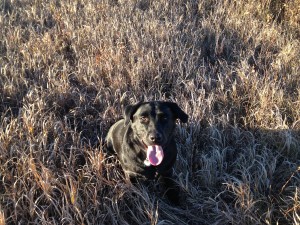
Kena.
The tract Harry suggests turns out to be loaded with pheasants. A big rooster gets up in front of Reid. He fires and misses. But instead of heading over the hill, the bird beats a path into the gauntlet. Matt fires. A miss. Jack fires. A miss. Chris unloads. The bird flies on. By the time the rooster passes me, it’s a forty yards out. I fire once. The rooster doesn’t crumple but glides headfirst into the side of a distant hill. There’s something about the landing that makes me think I got lucky.
“I think that bird’s hit.”
“We can check for it on the way back,” Chris replies with lack of enthusiasm. “We’ll work that hillside into the wind.”
Another rooster gets up. Again, it’s a long shot. Again my 12 gauge barks. Twice. The first shot misses. The second one doesn’t. Lexie is on the bird and retrieves it. The bird is stone dead. I let out a whoop. I’m unable to control my joy after three and half days of being snake bitten. Jack takes exception to my display. Words are said. Tempers flare. Jack is ready to join Grandpa Harry in the car. Things get smoothed over and we walk on.
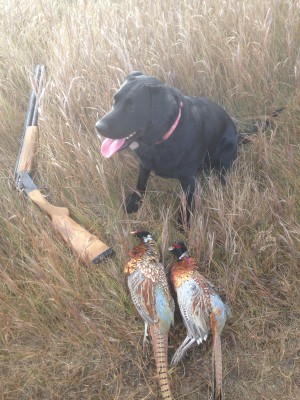
Kena and birds.
“What the hell?” Chris says as Kena shoves her nose into thick grass right beneath Chris’s feet.
The dog pulls out the rooster I’d hit from across the valley. It’s stone dead, likely due to a single lucky pellet to the head that caused it to glide on pheasant auto-pilot.
“Good girl,” Chris says, admiring the bird as Kena holds the rooster in her mouth. Chris puts the bird in my game pouch.
We cover the shoreline of the big lake Harry thought would hold birds. I hit another rooster rising out of thick cattails. After ten minutes of Kena chasing the wounded bird through impassable cover, I’m ready to give up when she trots back to me with a wing shot rooster in her mouth. I wring the bird’s neck. I have my limit. I am redeemed.
Reid, Matt, and Jack all hit birds. We lose a couple of roosters that appeared to be dead in flight. The pheasants hit the ground running and disappear in cover. Lexie limps along, her heart in the game but her body saying, “Put me in the kennel.” Matt does just that. Kena bounds on. The discord between Grandpa and me and Jack and me has settled. Jack and I are teased when we engage in what Jack calls a “bro hug”. As dusk approaches, Reid sets his phone to sound an alarm at sunset. We find a beautiful piece of land; a big marsh at the bottom of a steep hill surrounded by harvested cropland. We walk a fence line. Hens erupt. We see no roosters. Kena retrieves a dead rooser that another hunting party shot. The Lab is unwilling to slow down. She locks up on a clump of grass surrounded by dry mud. The patch of grass is no bigger than a loaf of bread. Kena holds point, one leg in the air in the classic pose, her tail straight and rigid.
“Fetch!”
The dog bounds forward. A hen busts out of hiding.
“Good girl, Kena.”
As the clock inches towards 5:13, Harry turns on the headlights of Chris’s SUV. He clearly believes we’re hunting illegally. We’re not. Reid’s watch will tell us when it’s time to stop. A big rooster explodes next to Jack. The bird flies over an oily puddle of marsh water. It’s a good sixty yards out when Jack shoots. The rooster tumbles and starts to run.
“Get the bird!” Jack yells.
Kena is following a rooster Chris missed but darts back towards Jack when she hears the command.
“Where’d it go down?” I ask.
“To your right,” Jack says.
I walk into ugly scum up to my shins. My newly waterproofed hunting boots stay dry but my long johns wick water. Kena can’t find the bird.
“Straight ahead,” Jack calls out.
“”5:13,” Reid announces. Hunters unload guns. I’m knee deep in quagmire. Kena snuffles. With daylight waning, I finally spy the bird: only its head and beak protrude from the cesspool I’m walking through. The rooster blinks as we make eye contact.
“Get the bird!”
The Lab shoves her head into the water and emerges with a ringneck. I take the rooster from the dog and hold it aloft.
“Better thank dad,” Matt says to Jack. “He saved your bird.”
“Thanks,” Jack says flatly as I tuck the rooster into his game pouch.
In the end, we down ten birds over our four days. Not a great hunt but one, because it marks Kena’s coronation as a diligent hunter and retriever, that’s memorable nonetheless.
“I think we need to reconsider giving up on Ashley,” I say to Chris as we drive back to the little frame house in town.
“Maybe,” is his only reply.
Peace.
Mark
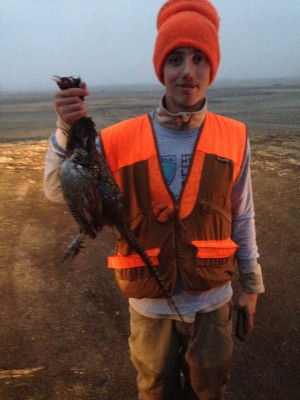
Jack and a rooster.


